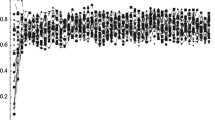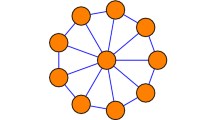Abstract
In this paper we shed new light on the Argument from Disagreement by putting it to test in a computer simulation. According to this argument widespread and persistent disagreement on ethical issues indicates that our moral opinions are not influenced by any moral facts, either because no such facts exist or because they are epistemically inaccessible or inefficacious for some other reason. Our simulation shows that if our moral opinions were influenced at least a little bit by moral facts, we would quickly have reached consensus, even if our moral opinions were affected by factors such as false authorities, external political shifts, and random processes. Therefore, since no such consensus has been reached, the simulation gives us increased reason to take seriously the Argument from Disagreement. Our conclusion is however not conclusive; the simulation also indicates what assumptions one has to make in order to reject the Argument from Disagreement. The simulation algorithm we use builds on the work of Hegselmann and Krause (J Artif Soc Social Simul 5(3); 2002, J Artif Soc Social Simul 9(3), 2006).
Article PDF
Similar content being viewed by others
Explore related subjects
Discover the latest articles, news and stories from top researchers in related subjects.Avoid common mistakes on your manuscript.
References
Boyd R. N. (1988) How to be a moral realist. In: Sayre-McCord G. (eds) Essays on moral realism. Cornell University Press, Ithaca, NY, pp 181–228
Brink D. O. (1989) Moral realism and the foundations of ethics. Cambridge University Press, Cambridge
Hartmann N. (1932) Ethics. George Allen & Unwin Ltd, London
Hegselmann R., Krause U. (2002) Opinion dynamics and bounded confidence models, analysis, and simulation. Journal of Artifical Societies and Social Simulation 5(3): 1–33
Hegselmann R., Krause U. (2006) Truth and cognitive division of labour: First steps towards a computer aided social epistemology. Journal of Artificial Societies and Social Simulation 9(3): 1–28
Krause U. (2008) Compromise, consensus and the iteration of means. Elemente der Mathematik 63: 1–8
Lorenz, J. (2007). Repeated averaging and bounded confidence modeling, analysis and simulation of continuous opinion dynamics. PhD thesis, Universität Bremen.
Lorenz, J., & Lorenz, D. A. (2008) On conditions for convergence to consensus. Arxiv preprint arXiv:08032211.
Mackie J. L. (1977) Ethics: Inventing right and wrong. Penguin, Harmondsworth
Shafer-Landau R. (2003) Moral realism: A defence. Oxford University Press, Oxford
Sturgeon N. L. (1985) Moral explanations. In: Copp D., Zimmerman D. (eds) Morality, reason, and truth: New essays on the foundations of ethics. Rowman & Allanheld, Totowa, pp 49–78
Tersman F. (2006) Moral disagreement. Cambridge University Press, Cambridge
Acknowledgments
Early versions of this paper were presented to audiences at conferences and seminars at the University of Colorado at Boulder, Stockholm University, Uppsala University, Lund University, Luleå University of Technology, Delft University of Technology, and the Buenos Aires Metaethics Workshop. We would like to thank the participants for very helpful comments. We also wish to thank two anonymous reviewers for equally helpful comments.
Open Access
This article is distributed under the terms of the Creative Commons Attribution Noncommercial License which permits any noncommercial use, distribution, and reproduction in any medium, provided the original author(s) and source are credited.
Author information
Authors and Affiliations
Corresponding author
Rights and permissions
Open Access This is an open access article distributed under the terms of the Creative Commons Attribution Noncommercial License (https://creativecommons.org/licenses/by-nc/2.0), which permits any noncommercial use, distribution, and reproduction in any medium, provided the original author(s) and source are credited.
About this article
Cite this article
Gustafsson, J.E., Peterson, M. A computer simulation of the argument from disagreement. Synthese 184, 387–405 (2012). https://doi.org/10.1007/s11229-010-9822-3
Received:
Accepted:
Published:
Issue Date:
DOI: https://doi.org/10.1007/s11229-010-9822-3




